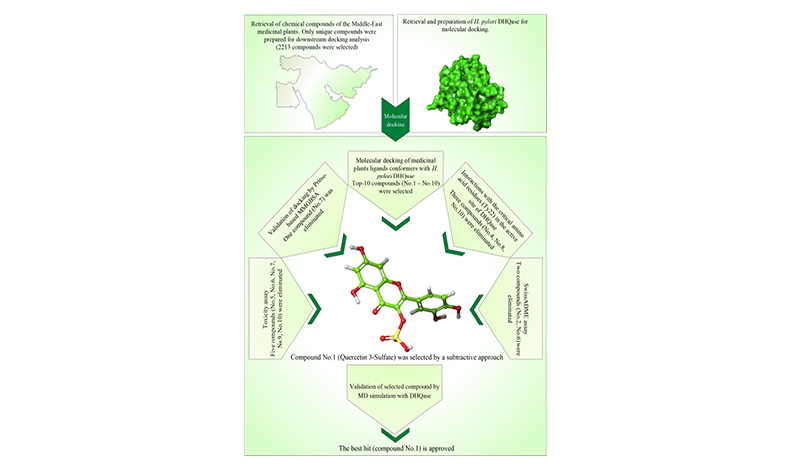Quercetin-3 Sulfate: A Novel Inhibitor Targeting Helicobacter Pylori Revealed through Molecular Docking and Dynamic Simulations
DOI:
https://doi.org/10.17344/acsi.2025.9336Abstract
Type II dehydroquinase (DHQase) is a pivotal enzyme in the synthesis of aromatic amino acids essential for Helicobacter pylori's survival. It possesses distinctive characteristics and exhibits limited sequence or structural similarity to other bacterial organisms. Molecular docking was employed to screen Middle Eastern medicinal plants to identify the most promising candidates for inhibiting DHQase with the highest affinity. Docking against DHQase was performed on 2,213 ligand conformers derived from 151 natural Middle Eastern medicinal plants. Ten hits with the most favorable docking scores were selected for subsequent ADMET assay analysis and molecular dynamic simulation. Of all of the top hits, quercetin-3 sulfate had the highest docking score. This compound adhered to the druglikeness roles and demonstrated no toxicity. MD simulations indicated that the quercetin-3 sulfate-DHQase complex exhibited higher levels of stabilized RMSD and higher values of stably contributed amino acid residues than other structures. This study underscores the novel inhibitory potential of quercetin 3-sulfate against DHQase, demonstrating the highest ligand affinity. This observation suggests the validity of quercetin 3-sulfate as a potent drug for combating H. pylori infection.

Downloads
Published
Issue
Section
License
Copyright (c) 2025 Mohammed Baqur Al-Shuhaib, Hayder O. Hashim, Mudher K. Mohammed , Jafar M. B. Al-Shuhaib

This work is licensed under a Creative Commons Attribution 4.0 International License.
Except where otherwise noted, articles in this journal are published under the Creative Commons Attribution 4.0 International License
